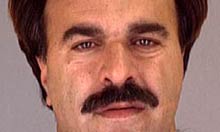The United States will apply the "toughest sanctions" to further isolate Iran over the alleged plan to murder the Saudi ambassador to Washington, Barack Obama said on Thursday, despite growing scepticism over the amateurish nature of the plot and the apparently shambolic background of the main suspect.
Obama insisted that the US had evidence to back up the allegations, as he said he would not take any options off the table in dealing with Iran - diplomatic code for the possibility of military action. Tehran has vehemently denied any involvement in the plot.
US authorities said on Tuesday they had evidence of a plot by two men linked to Iran's revolutionary guard to kill Saudi Arabia's ambassador to the United States, Adel al-Jubeir, by setting off a bomb in a Washington restaurant.
Speaking at a joint press conference with South Korean President Lee Myung-bak, Obama said: "Now those facts are there for all to see. We would not be bringing forward a case unless we knew exactly how to support all the allegations that are contained in the indictment."
In addition to prosecutions, Obama said he would continue "to apply the sort of pressure that will have a direct impact on the Iranian government until it makes a better choice in how it interacts with the rest of the international community".
The State Department revealed on Thursday that the US had been in direct contact with Iran over the allegations. "We are not prepared at the moment to go any further on the question of who spoke to whom, and where, but just to confirm that we have had direct contact with Iran,'' said spokeswoman Victoria Nuland.
The president's comments came as two congressional committees held hearings on Iran. In testimony to the Senate banking committee, David Cohen, the US Treasury's under-secretary for terrorism and financial intelligence, said the administration was considering sanctions against Iran's central bank.
Cohen described the alleged plot as a "dramatic reminder that the urgent and serious threat we face from Iran is not limited to Iran's nuclear ambitions".
Ileana Ros-Lehtinen, chair of the House Foreign Affairs committee, said the assassination plot "illustrates Iran's active campaign" to partner with extremists groups and drug traffickers.
But as more details have emerged, there has been growing scepticism over the true nature of the threat, not least because the main suspect has been revealed to be a chaotic used car salesman, nicknamed "Scarface", with a string of failed businesses behind him.
 Manssor Arbabsiar.
Manssor Arbabsiar.
Manssor Arbabsiar, a naturalised US citizen, was arrested last month, and stands accused of running a global terror plot that stretched from Mexico to Tehran. He is accused of having links to Quds Force, an elite unit of the Iranian Revolutionary Guard. The other suspect, Gholam Shakuri, is said by the US to be in Iran.
But Tom Hosseini, a friend and former roommate of Arbabsiar's, questioned his ability to carry out the plot and told the New York Times: "His socks would not match. He was always losing his keys and his cellphone."
Hosseini said when he last saw his friend two months ago, Arbabsiar told him he had been in Iran and was "making good money".
US officials concede that the plot and its alleged mastermind are unusual. ''We would expect to see the Quds Force cover their tracks more effectively,'' one official told Reuters. Another said a plot to launch a violent attack inside the United States was ''very outside the pattern'' of recent Quds Force activities.
Kenneth Katzman, an Iran specialist at the Congressional Research Service, said there were elements of the alleged plot that did not make sense.
''The idea of using a Texas car salesman who is not really a Quds Force person himself, who has been in residence in the United States many years, that doesn't add up,'' Katzman said.
''There could have been some contact on this with the Quds Force, but the idea that this was some sort of directed, vetted, fully thought-through plot, approved at high levels in Tehran leadership I think defies credulity,'' he said.

